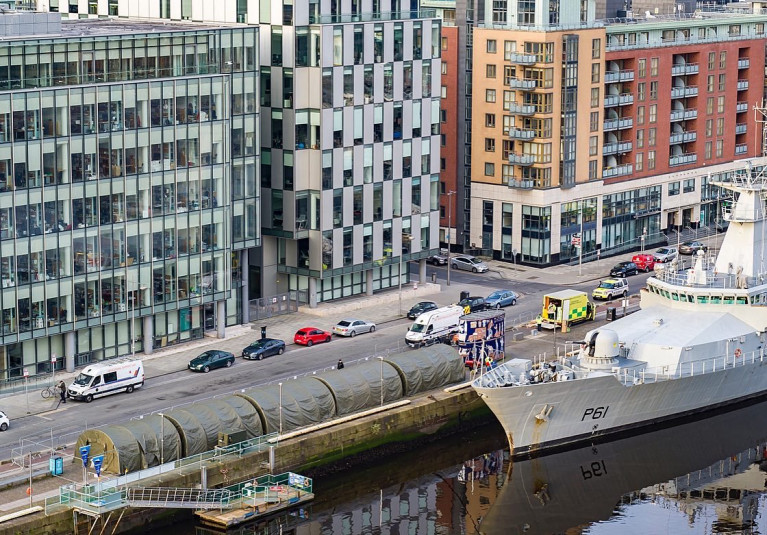Displaying items by tag: Covid19 Test Centres
As Naval Service Ships Swap At Covid-19 Testing Centre, Appeal is Launched for Members to Re-Join
When the P60 class L.E. Samuel Beckett took up critical supporting duties along with the army to assist the HSE establish a Covid-19 virus testing centre on the Liffey in Dublin last month, a further two navy patrol vessels have been involved, writes Jehan Ashmore.
As part of the nationwide effort to fight Covid-19 the Naval Service has Applications now open for former members of Óglaigh na hÉireann (Defence Forces) to rejoin as now is the time! For further information and T&Cs to apply, click HERE
Last night the slightly smaller offshore patrol vessel (OPV) of the P50 class LE. Niamh arrived in Dublin Port (from Galway) to berth at Sir John Rogerson's Quay to continue to help in running the test centre. There are three 'port' related test centres, the other two are located in the Ports of Galway and Cork along the city quays.
LE. Niamh (P52) has directly taken over from L.E. George Bernard Shaw (P64). This OPV had previously occupied the same Liffey berth before swapping with L.E. Samuel Beckett (P61) last week, on the Tuesday.
On that occasion, the changeover of OPV's in the Dublin Docklands took place under the cover of darkness. This was reminiscent of another nighttime arrival as LÉ William Butler Yeats (P63) entered the Port of Galway just over a week ago in Dun Aengus Dock. The OPV's presence in the mid-west city port was also part of Óglaigh na Éireann's efforts to generate more capacity for the HSE where the second testing centre was established to combat Covid-19.
The third Covid-19 test centre followed when the HPV flagship L.E. Eithne (P31) was reactivated into service at the Naval Service Base in Cork Harbour. From Haulbowline Island, the HPV made the short passage upriver of the Lee to berth in Cork City on Kennedy Quay, part of the South Quays or Jetties as they are also known.
So why the reason for such swapping of offshore patrol vessels?
According to the Naval Service, whilst we are currently deployed in Dublin, Cork and Galway, we will continue to rotate our ships to ensure essential maritime, defence and security operations as normal.
In addition Afloat adds no doubt the changeover gives crew's time off such duties and to continue maintaining routine duties in patrolling this island nation.
An example been L.E. George Bernard Shaw which Afloat tracked departing Dublin Port this afternoon. The ship is the newest OPV of the fleet which was commissioned into service in late 2018.

























































